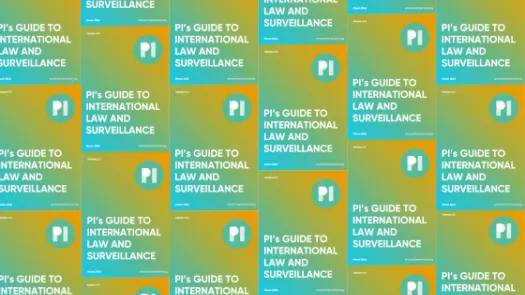Artificial Intelligence and its applications are a part of everyday life: from social media newsfeeds to mediating traffic flow in cities, from autonomous cars to connected consumer devices like smart assistants, spam filters, voice recognition systems, and search engines.
AI has the potential to revolutionise societies in many ways. However, as with any scientific or technological advancement, there is a real risk that the use of new tools by states or corporations will have a negative impact on human rights, including the right to privacy.
AI-driven consumer products and autonomous systems are frequently equipped with sensors that generate and collect vast amounts of data without the knowledge or consent of those in their proximity. AI methods are being used to identify people who wish to remain anonymous; to infer and generate sensitive information about people from non-sensitive data; to profile people based upon population-scale data; and to make consequential decisions using this data, some of which profoundly affect people’s lives.
What is the problem
The range and diversity of AI applications means that the problems and risks are manifold. These include:
- Re-identification and de-anonymisation: AI applications can be used to identify and thereby track individuals across different devices, in their homes, at work, and in public spaces. For example, while personal data is routinely (pseudo-)anonymised within datasets, AI can be employed to de-anonymise this data. Facial recognition is another means by which individuals can be tracked and identified, which has the potential to transform expectations of anonymity in public space.
- Discrimination, unfairness, inaccuracies, bias: AI-driven identification, profiling, and automated decision-making may also lead to unfair, discriminatory, or biased outcomes. People can be misclassified, misidentified, or judged negatively, and such errors or biases may disproportionately affect certain groups of people.
- Opacity and secrecy of profiling: Some applications of AI can be opaque to individuals, regulators, or even the designers of the system themselves, making it difficult to challenge or interrogate outcomes. While there are technical solutions to improving the interpretability and/or the ability to audit of some systems for different stakeholders, a key challenge remains where this is not possible, and the outcome has significant impacts on people’s lives.
- Data exploitation: People are often unable to fully understand what kinds and how much data their devices, networks, and platforms generate, process, or share. As we bring smart and connected devices into our homes, workplaces, public spaces, and even bodies, the need to enforce limits on data exploitation becomes increasingly pressing. In this landscape, uses of AI for purposes like profiling, or to track and identify people across devices and even in public spaces, amplify this asymmetry.
What is the solution
The development, use, research, and development of AI must be subject to the minimum requirement of respecting, promoting, and protecting international human rights standards.
Different types of AI and different domains of application raise specific ethical and regulatory human rights issues. In order to ensure that they protect individuals from the risks posed by AI as well as address the potential collective and societal harms, existing laws must be reviewed, and if necessary strengthened, to address the effects of new and emerging threats to rights, including establishing clear limits, safeguards and oversight and accountability mechanisms.
What PI is doing
Many areas of PI’s work touch on AI applications in different contexts, including in advertising, welfare and migration.
Across these areas and more we are working with policy makers, regulators and other civil society organisations to seek to ensure that there are adequate safeguards accompanied by oversight and accountability mechanisms.
Here are some examples:
- We investigate the creeping use of facial recognition technology across the world; work with community groups, activists, and others to raise awareness about the technology and what they can do about it; and push national and international bodies to listen to peoples’ concerns and take steps to protect rights.
- We have launched a legal challenge against UK intelligence agency M15, over their handling of vast troves of personal data in an opaque ‘technical environment’.
- We scrutinise invasive and often hidden profiling practices, whether by data brokers, on mental health websites or by law enforcementand how these can be used to target people. We challenge these practices as well as providing recommendations to policy-makers.
- We demand transparency on the use AI applications, whether by companies such as Palantir in response to the Covid-19 crisis, by those developing digital identity ‘solutions’, by political parties in their digital campaigns or public authorities, such as the UK National Health Service as part of their contract with Amazon.






